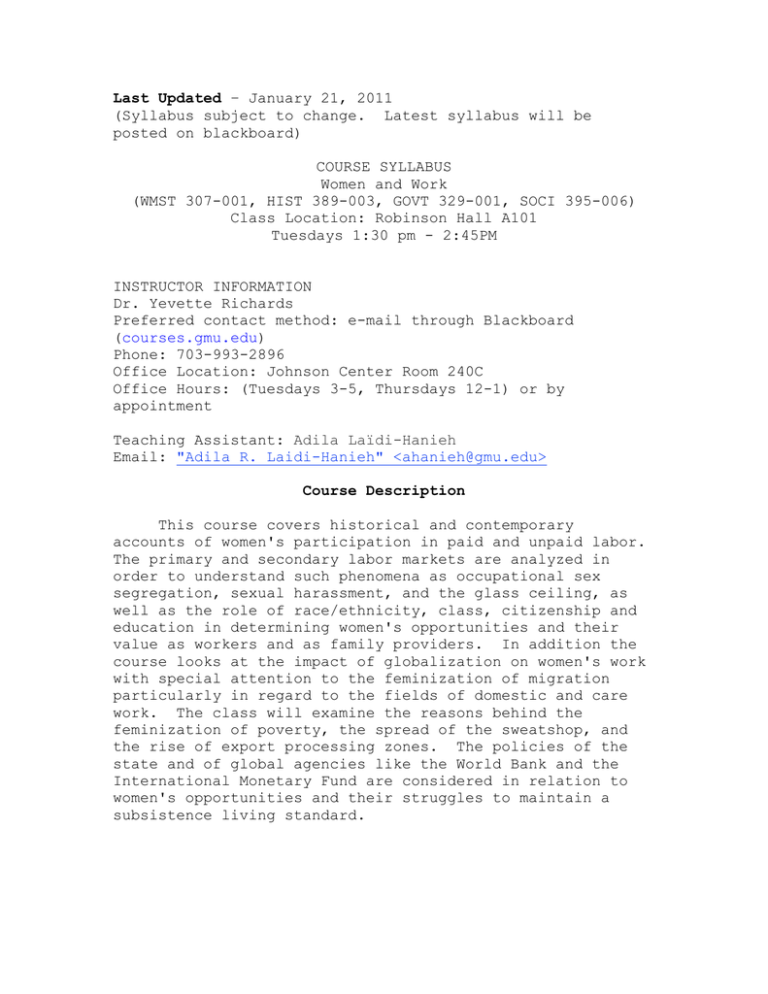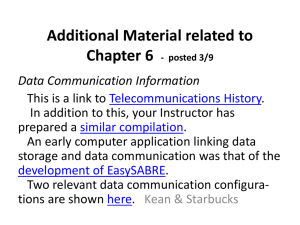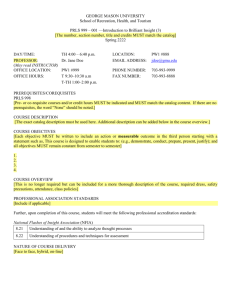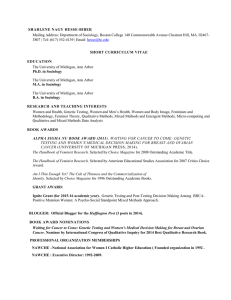2011 Spr HIST 389 003 Richards
advertisement

Last Updated – January 21, 2011 (Syllabus subject to change. Latest syllabus will be posted on blackboard) COURSE SYLLABUS Women and Work (WMST 307-001, HIST 389-003, GOVT 329-001, SOCI 395-006) Class Location: Robinson Hall A101 Tuesdays 1:30 pm - 2:45PM INSTRUCTOR INFORMATION Dr. Yevette Richards Preferred contact method: e-mail through Blackboard (courses.gmu.edu) Phone: 703-993-2896 Office Location: Johnson Center Room 240C Office Hours: (Tuesdays 3-5, Thursdays 12-1) or by appointment Teaching Assistant: Adila Laïdi-Hanieh Email: "Adila R. Laidi-Hanieh" <ahanieh@gmu.edu> Course Description This course covers historical and contemporary accounts of women's participation in paid and unpaid labor. The primary and secondary labor markets are analyzed in order to understand such phenomena as occupational sex segregation, sexual harassment, and the glass ceiling, as well as the role of race/ethnicity, class, citizenship and education in determining women's opportunities and their value as workers and as family providers. In addition the course looks at the impact of globalization on women's work with special attention to the feminization of migration particularly in regard to the fields of domestic and care work. The class will examine the reasons behind the feminization of poverty, the spread of the sweatshop, and the rise of export processing zones. The policies of the state and of global agencies like the World Bank and the International Monetary Fund are considered in relation to women's opportunities and their struggles to maintain a subsistence living standard. Texts Sharlene Nagy Hesse-Biber and Gregg Lee Carter, Working Women in America: Split Dreams Nancy MacLean, Freedom Is Not Enough: The Opening of the American Workplace Liza Featherstone, Selling Women Short: The Landmark Battle for Worker's Rights at Wal-Mart Grace Chang, Disposable Domestics: Immigrant Women Workers in the Global Economy Learning objectives At the end of this course, students will … have knowledge of major periods in the US of structural economic change that have affected the nature of women’s work; understand the structural approach for analyzing women’s work; have acquired knowledge of critical issues affecting women in the workplace, e.g. sexual harassment, glass ceiling and other forms of discrimination and sex stereotyping; understand how socialization and gender role expectations in the home at work and in other institutions affect women’s opportunities; know the legal challenges that have advanced women’s opportunities and rights in the workplace; have knowledge of the diversity of women’s work experiences by understanding the segmentation of labor markets by race, class, gender, nationality, citizenship status, age, affirmed or perceived sexual orientation, and other markers of identity; understand women’s labor by examining the connections between the consumption in the developed world and production in the developing world; understand the economic forces behind the feminization of labor and its links with the feminization of poverty; be able to explain from a historical and contemporary perspective the reasons governments have facilitated the efforts to export cheap labor both. Grade Policy All course work is due on the appointed day. Half of a letter grade deduction will be made daily for any late assignments. Exams are only given on the assigned day, unless the student provides acceptable documentation for absence such as a doctor’s excuse. Grading Scale 100-95 A+ 94-93 A 92-90 A 89-87 B+ 86-83 B 82-80 B79-77 C+ 76-73 C 72-70 C69-60 D 59 and below F Course Requirements and Methods of Instruction and Evaluation Student participation – 15% Midterm exam - 30% Class Paper on the MacLean book – 20% Final exam - 35% Student participation: On three occasions students will identify a main argument or theme that is presented in the literature. At least a day before their assigned class meets students should post the argument or theme along with a related discussion question on blackboard. Be sure not to post a similar question to one already posted by a fellow student. Class Paper on the MacLean book: Due April 5. Students will write an analysis of the book’s major themes and provide an assessment of the author’s arguments? If students wish to dispute or qualify any of MacLean’s arguments they must do so by using scholarly sources. Conjecture, personal experience, and nonscholarly sources of information cannot be used as evidence. Papers should be 4 to 5 pages, double-spaced with 12-point font and regular one-inch margins. Students’ names and other identifying information should be confined to the header section and not be part of the text. A paper shorter than 4 full pages will incur a significant grade reduction. *** All written work should be proofed for grammar and spelling. Midterm and final exams: The midterm exam covers material from the beginning of the semester. The final will cover only the material after the midterm. These exams will consist of multiple choice, short answer, and longer essay questions. Review questions will be posted on blackboard. *** Keep a copy of all the work you hand in and a copy of all work that is returned to you. Students who regularly participate in discussions may see their final course grade bumped up to the higher grade if their grade is borderline. If a student misses a lot of classes and does not participate regularly, she or he will not get added consideration in terms of raising grades. About Writing Skills Students may elect to visit the Writing Center on their own to get help with writing strategies. After your first writing assignment I may recommend students who would benefit from improving their writing skills to visit the writing center. These services are valuable and free. “The Writing Center will not proofread your work for you, but we will work with you to develop revision and editing strategies that can last a lifetime. Our tutors want to emphasize positive attitudes and helpful ways of thinking about writing. We want you to become more confident and effective writers across the curriculum and in your personal and professional lives.” http://writingcenter.gmu.edu/ 703-993-1200 wcenter@gmu.edu About Blackboard This course management system is a very important tool for this class. I will post on blackboard the syllabus, instructions for all course assignments, deadlines, recommended readings, and links to relevant web sites and selected campus resources. If any changes occur in the syllabus I will post an updated document. I will announce in class any changes to the syllabus and also alert you through the blackboard message board. I prefer blackboard email for correspondence. I will check it often so please avoid sending me an email through the George Mason email system. PLEASE NOTE: COURSE POLICIES 1. George Mason University Honor System and Code Honor Code George Mason University has an Honor Code, which requires all members of this community to maintain the highest standards of academic honesty and integrity. Cheating, plagiarism, lying, and stealing are all prohibited. All violations of the Honor Code will be reported to the Honor Committee. Plagiarism (statements from Mason Web Site) Plagiarism means using the exact words, opinions, or factual information from another person without giving that person credit. http://mason.gmu.edu/~montecin/plagiarism.htm#plagiarism Please familiarize yourself with the Honor System and Code, as stated in the George Mason University Undergraduate Catalog. When you are given an assignment as an individual, the work must be your own. Some of your work may be collaborative; source material for group projects and work of individual group members must be carefully documented for individual contributions. http://mason.gmu.edu/~montecin/plagiarism.htm 2. Class Registration Students are responsible for verifying the accuracy of their own schedules. Students need to check PatriotWeb regularly to verify that they are registered for the classes that they think they are. This is particularly important since students are no longer dropped for nonpayment. Faculty may not allow a student who is not registered to continue to attend class and may not grade the work of students who do not appear on the official class roster. Deadlines each semester are published in the Schedule of Classes available from the Registrar's Website registrar.gmu.edu The add and drop deadlines for classes: Last Day to Add (Full-Semester Course): February 8 Last Day to Drop (Full-Semester Course): February 25 Selective Withdrawal Period (undergraduate students only): Feb. 28 – Apr. 1 After the last day to drop a class, withdrawing from this class requires the approval of the dean and is only allowed for nonacademic reasons. 3. Accommodations for students with disabilities: If you are a student with a disability and you need academic accommodations, please see me and contact the Office of Disability Resources at 703-993-2474. All academic accommodations must be arranged through that office. The need for accommodations should be identified at the beginning of the semester and the specific accommodation has to be arranged through the Office of Disability Resources. Faculty cannot provide accommodations to students on their own (e.g. allowing a student extra time to complete an exam because the student reports having a disability). COURSE SCHEDULE January 25 Introduction and assignments for leading class discussion. Please provide your top five date choices on blackboard by January 26th at noon. Students who do not provide information will be assigned to any dates left. Historical Overview January 27 Film - New York, a documentary film. [Episode 4], The Power and the People, 1898-1918 (Triangle Fire) Call Number: F128.3.N563 2005 episode 4 INTERNET February 1 Hesse-Biber and Carter, “A Brief History of Working Women…” Working Women in America, 20-46. February 3 Hesse-Biber and Carter, “A Brief History of Working Women…” Working Women in America, 46-71. Sexual Harassment February 8 Kimberlé Crenshaw, “Whose Story is it Anyway? Feminist and Antiracist Appropriations of Anita Hill,” (402-440), Toni Morrison, ed. Race(ing) Justice, (En)gender(ing) Power: Essays on Anita Hill, Clarence Thomas and the Construction of Social Reality (Blackboard) February 10 Kendall Thomas, "Strange Fruit," 364-389 Toni Morrison, ed. Race(ing) Justice, (En)gender(ing) Power: Essays on Anita Hill, Clarence Thomas and the Construction of Social Reality (Blackboard) February 15 cancelled Class meets on February 16 (Wednesday) Class will meet today at the Johnson Center Cinema for film viewing and panel discussion. Anita Hill vs. Clarence Thomas: The Untold Story (KF8475.T48 A54 1995) (Sign attendance sheet) Those absent from the event must write a two-page reflection on the film or on the article below. Students may view the film in the JC Library or in the Women’s and Gender Studies Center (240C). (Due Feb. 22) Anita F. Hill, “Tilting the Scales: The Changing Roles of Women in the Law and Legal Practice: Embodiment of Equal Justice under the Law,” Leo C. Goodwin Symposium, Nova Law Review, 2006 (Blackboard) February 17 Myrtle P. Bell et al., "Discrimination, Harassment, and the Glass Ceiling: Women Executives as Change Agents," Journal of Business Ethics, April 15, 2002 v. 37 i.1: 65-77. (EJournal) Occupational Segregation and the Glass Ceiling February 22 Film - Breaking the Glass Ceiling Part 1 (HD 6054.3.B74 1997) Hesse-Biber and Carter, “Professional and Managerial Women,” Working Women in America, 192-220. February 24 Hesse-Biber and Carter, “Gender Inequality, Economic and Legal Explanations…” Working Women in America, 72-91. March 1 Midterm March 3 Sojourner Truth Lecture Series: Anita Hill 1:30 pm Center for the Performing Arts, Concert Hall (Sign attendance sheet at the event) The Labor Connections between the Women’s Movement and the Black Freedom Movement March 8 MacLean, “The Fight Begins,” Freedom Is Not Enough: The Opening of the American Workplace, 35-75. March 10 MacLean, “Civil Rights at Work,” Freedom Is Not Enough: The Opening of the American Workplace, 76-116. March 15 Spring Break March 22 MacLean, “Women Challenge Jane Crow,” Freedom Is Not Enough: The Opening of the American Workplace, 117-154. March 24 MacLean, “Conservatives Shift from ‘Massive Resistance’ to ‘Color Blindness’,” Freedom Is Not Enough: The Opening of the American Workplace, 225-264. March 29 MacLean, “The Lonesomeness of Pioneering,” Freedom Is Not Enough: The Opening of the American Workplace, 265-299. March 31 MacLean, “The Struggle for Inclusion Since” and “Epilogue,” Freedom Is Not Enough: The Opening of the American Workplace, 300-348. April 5 Due: MacLean paper Film - Taking the Heat: The First Women Firefighters of New York City (HD8039.F52 U5 2005) Web sites: http://www.pbs.org/independentlens/takingtheheat/ http://takingtheheat.com/ The Maternal Wall and Low Wage Workers April 7 Film - The Motherhood Manifesto (HQ759 .B59 2006) Web site: http://www.momsrising.org/film April 12 Hesse-Biber and Carter, “Working Women and Their Families,” Working Women in America, 221-246. April 14 Film - Wal-Mart: The High Cost of Low Price (HF5429.215.U6 W356 2005, DVD) April 19 Liza Featherstone, Selling Women Short, 1-33, 42-58, 71-84, 96-100. April 21 Liza Featherstone, Selling Women Short, 104-139, 143-153, 157-162, 171-176. April 26 Liza Featherstone, Selling Women Short, 192-200, 207-208, 217-222, 229-230, 232-240, 250-253, 262-268. Globalization and Economic, Social, and Political Challenges April 28 Film - Alienated Undocumented Immigrant Youth (HV4010 .A55 2005) Web sites: http://www.snagfilms.com/films/title/alienated_undocumented _immigrant_youth/ http://www.evc.org/store/videos/alienated-undocumentedimmigrant-youth Hesse-Biber and Carter, “Women in Everyday Jobs,” Working Women in America, 141-173…. May 3 Grace Chang, Disposable Domestics: Immigrant Women Workers in the Global Economy, 21-27, 32-48, 55-61, 70-79. May 5 Grace Chang, Disposable Domestics: Immigrant Women Workers in the Global Economy, 123-151, 158-165. May 12 Final Exam 1:30PM – 4:15PM



